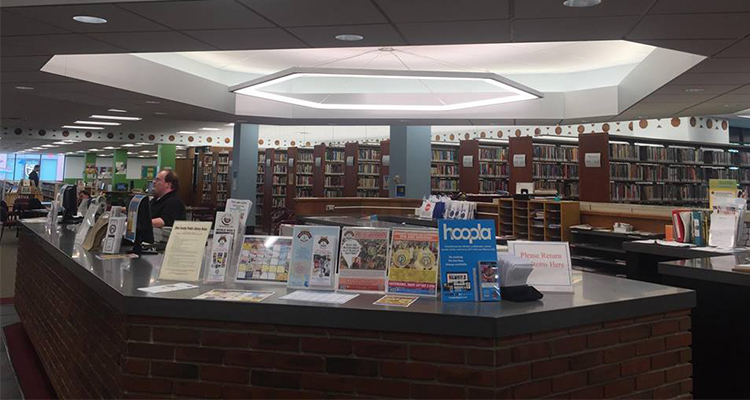Saturday, I went to a party at the Ohio County Public Library (OCPL). Most of you are probably thinking (with a fair amount of sarcasm), “I bet that was a good time.” Let me tell you, it was! Libraries are not simply book repositories where patrons are warned to be quiet. They are central community locations that serve dozens of functions for citizens. Our library in downtown Wheeling is no exception, and its unique past contributes to its importance in the present.
The history of the OCPL is far from boring. In fact, it involves Andrew Carnegie, a famous railroad and a cemetery. From as early as 1807, the city of Wheeling (then Virginia) had subscription libraries, which charged patrons a fee for using library resources. One of those subscription libraries, the Mercantile Library Association, chartered the free Wheeling Public Library in 1859. When it closed in 1881, the Board of Education met to organize a new public library and sought legislation necessary to have it operated by state funds. The Wheeling Public Library opened on Oct. 12, 1882, with the collection from the former Mercantile Library Association serving as its backbone.
According to the OCPL website and research conducted by Dr. Charles Julian, associate university librarian at Potomac State College of West Virginia University, the new library was housed over R.J. Smyth(e)’s grocery at the corner of 14th and Market streets (later the Hub Department store). Subsequent locations included: Masonic Temple (1894-1907), Schmulbach Building (1907-May 1910), Delaplain Dry Goods on Main Street (1910-1911) and the Maxwell Home at 2100 Market St. (Jan. 9, 1911-May 18, 1973).
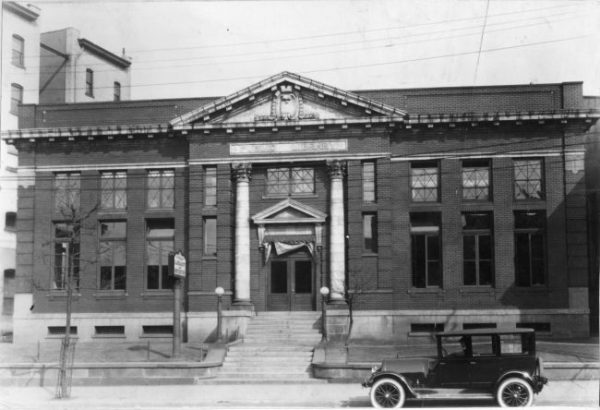
On May 19, 1973, the OCPL opened its current facility at 52 16th St. As a lover of books who has moved my own collection several times, I wince at the monumental tasks and beam at the even more powerful love that drove these early Wheelingites to schlep all those books from location to location throughout the decades. According to Ted Hess Jr., long-time library board member and former chair, local Boy Scout troops moved the boxes from the Market Street location to the new library building in 1973. He described truckload after truckload being hauled out of the old library and into the new one by an army of khaki-clad boys.
Powerful Union Voices
But the moves weren’t seamless by any means. In the latter part of 1903, Wheeling board members asked Carnegie to build them a library. Most of the town’s key players — city council, mayor, business leaders — were in favor of this request, and $75,000 was granted by Carnegie for a Wheeling library. All the city had to do was pass a $50,000 bond levy to purchase the land and pay for operating costs. But the Ohio Valley Trades and Labor Assembly, which represented more than 4,000 Wheeling workers in forty unions, spoke out against the gift.
They hadn’t forgotten the Homestead Strike of 1892.
In 1892 Carnegie ordered Pinkerton guards to push back against striking workers at his steel mill in Homestead, Pa. In the end, 10 steelworkers and three Pinkerton guards were killed. Wheeling’s union workers had supported the Homestead laborers and were embittered by Carnegie’s callousness and greed. They spoke out against the bond needed to build the library. Mike Mahoney, a Wheeling steelworker, asked the citizens of Wheeling to defeat the bond levy, “thereby paying tribute to our murdered comrades, whose ashes repose in the precious soil at Homestead.” In “Part of Our Lives: A People’s History of the American Public Library” by Wayne A. Wiegand, an unnamed Wheeling union leader is quoted urging Wheeling’s working class members to vote “no” on the bond, so that “there will be one place on this great green earth where Andrew Carnegie can’t get a monument with his money.”
At the time, only one member of Wheeling City Council was against Carnegie’s promised funds. In his opposing resolution, John Connelly spoke out against the proposal, citing the Homestead strike has his reasoning. He wrote, “we recommend to Mr. Carnegie that he give his proposed $50,000 to the widows and orphans created by him on the banks of the Monongahela on the morning of July 6, 1892.”
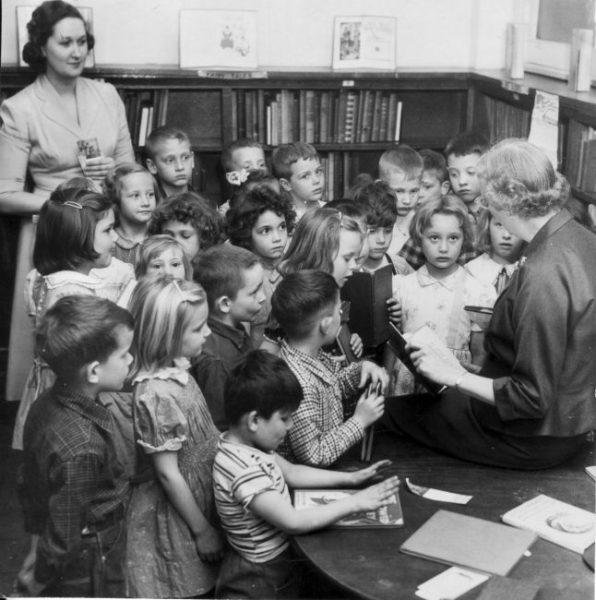
The oppositional efforts worked, and in January 1904, during a spring flood, Wheeling voters failed to pass the bond needed to secure the funding from Carnegie. Although it won the popular vote, it did not win the majority of districts with working-class neighborhoods of South and East Wheeling voting three-to-one against the gift. Wheeling became the only city in West Virginia and one of a scarce few around the country to reject Carnegie’s money.
Many people were disappointed by this result. A scathing article from the Jan. 27, 1904, “Wheeling Daily Intelligencer” rails against the voices of laborers, stating that “Wheeling is counted among cities that set their faces against progress.”
Over a period of decades, Carnegie donated more than $40 million to build 1,679 public libraries across the United States, according to an article in the “American Library Association Bulletin.” Nonetheless, his name does not emblazon the Ohio County Public Library in Wheeling, W.Va.
The People Prevail
Still, the people of Wheeling wanted a new library, so the Board of Education set about gathering the funds to make it happen. Designed by Charles W. Bates, the new library opened its doors in January 1911 at 21st and Market streets. The children’s department would open the following year, and the library would go on to achieve great heights. Throughout the 1920s, the library was known for its vast book collection. In the 1930s, the library would create the state’s first bookmobile, large audio collections, branch libraries and audiovisual materials.
In 1932, legislation was passed that excluded funding of public libraries from the state budget. County districts were formed, and the Ohio County Board of Education was created. In 1933 the Ohio County Public Library was born, and the maintenance funding would come from Board of Education levies and real estate taxes.
What Lies Beneath
The current location of the OCPL (52 16th St.) has its own story. The land on which our current library sits was deeded in 1816 to the city of Wheeling by Noah and Mary Zane for the purpose of a burial ground, and that is just what it was used for until around 1850 when the ground was purchased by the Hempfield Railroad Company to be used for a railyard and depot. The city had grown up around the cemetery, and there were few plots left for new burials; therefore, the city sold the land, and the bodies were supposedly relocated to Mt. Wood, Peninsula, Manchester and East Wheeling cemeteries. The Hempfield Yard, as it was called, was a busy station for many different railroads for over 60 years.
The land changed hands again in 1871 when B&O Railroad bought it and built a power plant complete with a massive smokestack. In 1908, they built a new passenger station across Chapline Street, which stayed in business until the early 1960s when rail travel fell out of favor.
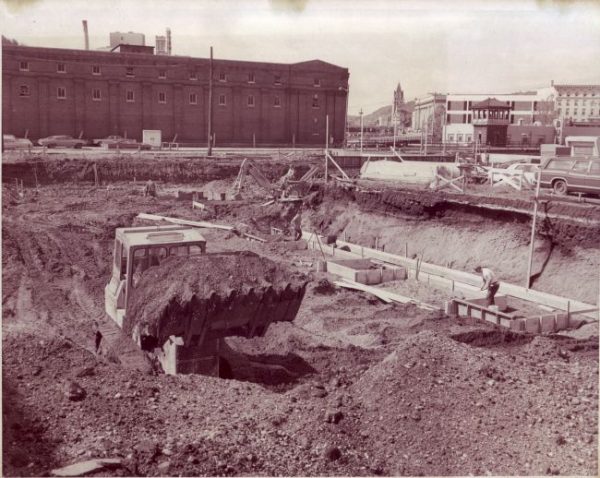
In 1968, the library board of trustees, which had been searching for a location for a new library, purchased the old B&O land, which had once been the Hempfield Yard, which had once been a cemetery. As in decades past, the new library was built in large part by the generosity of the citizens of Ohio County. According to Hess, the board needed $1.5 million for the project but had just $150,000 in its reserves. Then-governor Arch Moore secured a $400,000 grant for the library. The remaining $400,000 was raised through donations from local citizens. Forsythe, Bergemann and Vanek, a Canton, Ohio, architectural firm, designed the new library, and on May 19, 1973, the new Ohio County Public Library opened its doors to all.
The Library’s Grand Re-opening
Forty-five years later, the OCPL remains West Virginia’s oldest tax-payer supported library. It boasts a wealth of resources, including books, CDs, DVDs and thousands of scanned documents available electronically. It serves an important role in Ohio County as it provides free meeting rooms for local organizations, computers for a community increasingly split by the digital divide, and programming for children and adults. In addition, the OCPL maintains the Wheeling Room, which holds documents related to Wheeling history, an archive of artifacts that pertain to the Ohio Valley and a vast online collection of historical resources through Archiving Wheeling.
To further increase its service to the community, the OCPL underwent renovations in 2017. On Saturday, May 19, 2018, a celebration was held to hail these improvements and the 45th anniversary of the library in its current location. The ceremony began with a contemporary re-creation of the 1973 ribbon-cutting, which included the raising of the American flag by members of Boy Scout Troop 6 of Wheeling, singing of the National Anthem by Faith Lennon Richter, an invocation by the Rev. Willie Nevels and opening remarks by Library Director Dottie Thomas. Ohio County Circuit Clerk, Brenda Miller, who appoints the library’s board of trustees, thanked board members past and present for their service.
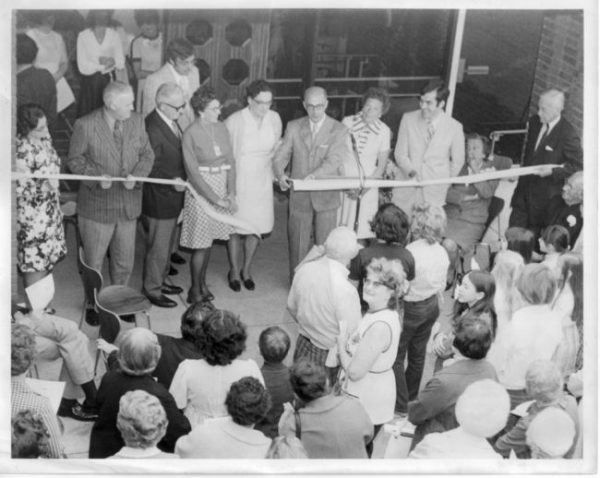
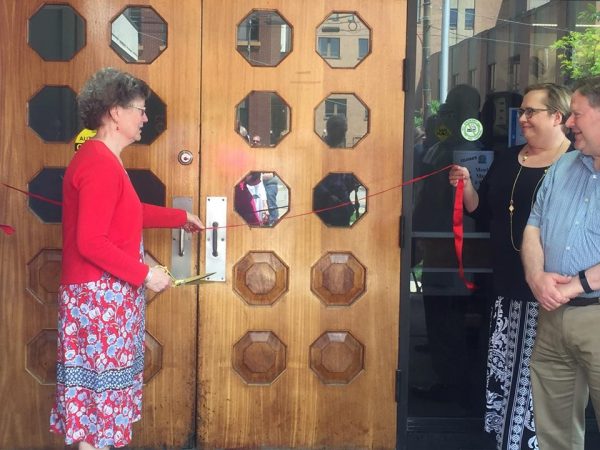
Following the ribbon cutting by Jimmie McCamic, current chair of the OCPL Board of Trustees, guests were invited to attend a program in the library’s auditorium. Marc Harshman, West Virginia poet laureate, shared his memories of the library in his Illinois hometown, saying, “I was lucky to be raised on books and stories. Without my hometown library, I would not be the man I am today or the poet laureate of this state.” He recited two reading-inspired poems: “There Is No Frigate Like a Book” by Emily Dickinson and “In the Library” by Charles Simic.
Following Harshman’s remarks, McCamic reflected on the importance of the library in the past, present and future, and praised board members for their hard work and dedication.
Secretary-Treasurer Greg Marquart described the many renovations completed in the past year. The exterior of the library was cleaned and repaired, including the roof, but the interior of the library received the most improvements, including updated and more accessible restrooms, energy-efficient windows, new ceilings and lighting throughout the building, updated computer servers and cables, and overhauled heating and cooling systems.
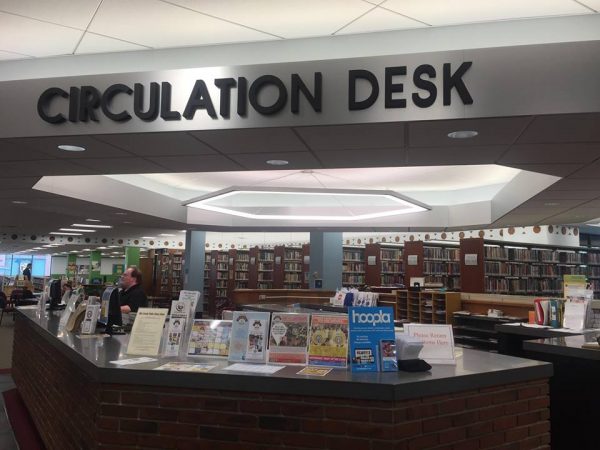
After a remembrance of the 1973 dedication by Hess, West Liberty University Professor Jean Bailey, daughter of late board member Thomas A. E. Stephan, recounted her father’s love of the library and his years of service both as a board member and chair.
Rabbi Joshua Lief gave the prayer of dedication, and Dr. Julian delivered a brief history of the library. His lecture included information about the struggles and triumphs that the library has faced in its 135-year history and applauded OCPL for being “the finest library in the state of West Virginia.”
Eleven people and two organizations were presented with the OCPL’s inaugural “Library Legend” award for dedication to the library. In addition to Harshman, Linda Comins, Richard Morriale, Kate Quinn, Peg Brennan, Beatrice Ann Thomas, Dr. David Javersak, Thomas A. E. Stephan, Ted Hess Jr., the Honorable Frederick P. Stamp and Joan Stamp, and George and Janice Seibert were honored for their extraordinary contributions to the OCPL. Wheeling Heritage and Wheeling Area Genealogical Society (WAGS) were also recognized for outstanding supporting the library and its patrons.
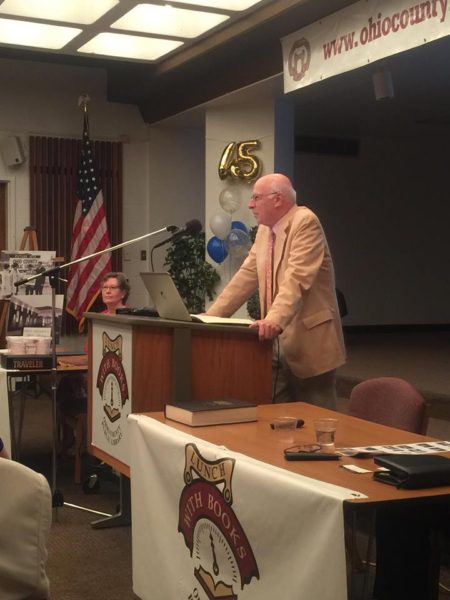
Father Jeremiah McSweeney gave the benediction, and the ceremony came to a close with the reading of an original poem by Wheeling poet, Bonnie Thurston. Similar to other speakers on this day, Thurston shared her love of libraries, referring to the scent of old books “as Chanel No. 5,” wishing that it was a real perfume that she could “daub all over her wrists.”
An Ongoing Community Celebration
The Grand “Re-opening” marked the beginning of the library’s annual OCPL week, “a week in which the library aims to increase public awareness of all the great resources available to the public at the Ohio County Public Library.” Running from May 19 through the 26, OCPL Week allows patrons to return overdue materials without paying fines. In addition to special displays, daily prizes and giveaways will be awarded throughout the week. Family Story Time will be held at 6:30 p.m. Monday, May 21, and Rebekah Karelis from Wheeling Heritage will present “Why Do Wheeling’s Old Places Matter?” at Lunch With Books at noon on May 22.
Finally, on Saturday, May 26, the library invites the public to celebrate the arrival of the Heinz History Center of Pittsburgh’s “We Can Do It! WWII” Traveling Exhibit. The day’s festivities will start at 1 p.m. in the library auditorium where Robert Stakeley, manager of the Heinz History Center Affiliates Program, will speak about the display, “Rosie the Riveter” will sing patriotic tunes, and an interfaith prayer of remembrance will be offered.
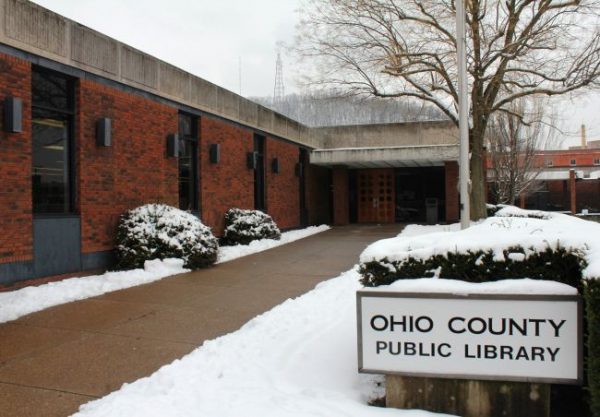
Attending the library’s grand re-opening was important to me. Although I was born six months after the library first opened its doors on 16th Street, I have come to love it as much as my hometown library in Moundsville, among whose stacks I spent many hot summer days and frigid winter evenings. We had few books at home, so the library’s generous resources served as my gateway to other worlds. I took shelter from bullies in that library, and I learned to do research by the passionate librarians who bustled behind the circulation desk. A chatty child, the library became an oasis where even I had no trouble being quiet as I lost myself behind page and after page of words.
The Ohio County Public Library was the first library my son visited when he was old enough to walk. Even our impressive home library is no match for the wealth of materials at the OCPL. One of my favorite memories with him is of us sitting together at a library table giggling at picture books. Like me, my son loves to read, and he loves the Ohio County Public Library.


